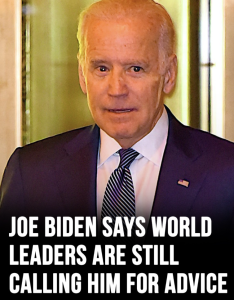Joe Biden Says World Leaders Still Call Him for Advice — Here’s What That Really Means
Despite facing mounting political pressure at home and increasing concerns about his age, President Joe Biden recently made a striking claim: world leaders are still calling him for advice. The comment, made during a campaign event and echoed in interviews, was meant to reassure Americans — and perhaps himself — that his global stature remains intact. But what does it truly mean when a sitting president, under scrutiny from his own party, insists that he’s still the one others turn to?
A Message of Relevance
Biden’s statement came at a time when questions about his leadership abilities are louder than ever. At 81 years old, and following a widely criticized debate performance against Donald Trump, some members of the Democratic Party and many political analysts have begun to wonder if Biden remains the right candidate to face Trump in the 2024 election.
Yet Biden’s remark about still receiving calls from world leaders seems aimed at cutting through the doubt. It was less about boasting and more about conveying one central message: “I still matter. I’m still capable.”
It’s not unusual for a U.S. president to speak of close ties with global counterparts. But in Biden’s case, the context is key. The subtext here is clear: while domestic critics question his viability, international figures — the very people who have to work with the U.S. in matters of war, peace, and climate change — still respect and trust him.
Biden’s Longstanding Global Ties
Joe Biden has long positioned himself as a foreign policy expert. With decades on the Senate Foreign Relations Committee and eight years as Barack Obama’s vice president, his experience is undeniable. Many world leaders know him personally.
Angela Merkel, Emmanuel Macron, and even former adversaries like Vladimir Putin have had interactions with Biden dating back many years. His experience gives him a kind of institutional memory that newer leaders often lack.
When Biden claims these leaders still call him, it’s entirely believable. But are they calling him for his opinion? Or are they trying to assess America’s uncertain political future?
Allies and Anxiety
Some sources suggest that world leaders have indeed been reaching out to Biden — but not just for advice. According to recent diplomatic leaks and reports from European outlets, some allies are deeply worried about the possibility of Donald Trump returning to office. In that context, their calls to Biden may be as much about gathering intelligence as they are about seeking wisdom.
If you’re the prime minister of Canada, or the chancellor of Germany, you’d naturally want to know if Biden is truly committed to running — and capable of winning. The geopolitical stakes are high. From Ukraine’s survival to climate agreements to the future of NATO, the difference between a Biden or Trump presidency is immense.
So yes, world leaders may be calling Biden. But they may be asking questions more than they’re taking notes.
A Man Fighting for Perception
Biden’s team knows that perception matters in politics. Every comment he makes now is under a microscope. With the media spotlight increasingly focused on his age, health, and potential withdrawal from the race, his claim about world leaders serves another purpose — projecting strength.
Whether he’s on stage or giving a speech at a union hall, Biden has to do more than outline policies. He has to look like the leader of the free world. Saying “they still call me” is his way of saying “I’m still the guy who can lead the free world.”
It’s emotional, not just strategic. Biden has spent his entire life preparing for this role. The idea of stepping back — especially if he truly believes he’s still capable — likely feels unbearable.
The Reality of Modern Diplomacy
Of course, phone calls between world leaders are standard practice. Presidents, prime ministers, and foreign ministers communicate frequently, especially when global events are in flux. With wars ongoing in Ukraine and Gaza, tensions rising in the Indo-Pacific, and a climate crisis looming, world leaders are in constant conversation.
But the reality of modern diplomacy is that advice is no longer one-sided. The world has changed. The United States, while still influential, isn’t the singular power it once was. China’s rise, Europe’s increasing autonomy, and regional alliances all complicate the idea that the U.S. — or its president — is always the “go-to” source of wisdom.
So when Biden says leaders call him for advice, it’s possible. But it’s also likely that those conversations are more collaborative and cautious than ever.
Critics Respond
Not everyone bought into Biden’s statement. Critics, especially on the right, mocked the comment as wishful thinking. “World leaders are probably calling to make sure he’s still awake,” one pundit joked on cable news. Others suggested Biden was exaggerating to cover up political vulnerability.
Some Democrats have also begun to worry that Biden’s attempts to project strength might backfire — painting a picture of denial rather than resilience.
But Biden’s defenders point out that global leaders wouldn’t waste time calling someone they didn’t respect. If they’re reaching out, it’s because they value continuity, experience, and Biden’s deep knowledge of international affairs.
A Risky Flex — Or a Necessary One?
In politics, confidence matters. But overconfidence can become dangerous, especially when reality doesn’t match the rhetoric. If Biden insists he’s still at the center of global conversations, but public stumbles continue or major allies start preparing for a post-Biden world, his words could quickly feel hollow.
Still, in the short term, the statement may help him regain some footing. To voters who worry about electability, Biden is signaling that he’s still the guy world leaders trust. That matters, especially in a race that could once again come down to international crises, war, and global alliances.
Final Thoughts
Whether Joe Biden is genuinely being sought after for advice — or simply receiving courtesy calls as a political courtesy — his statement speaks volumes about where he sees himself in the global order. It’s not just about diplomacy. It’s about identity.
He is, after all, a man who has lived his entire adult life in public service, much of it in global affairs. He may stumble, he may face pressure to step aside, but for now, he insists: the world still listens when Joe Biden picks up the phone.

